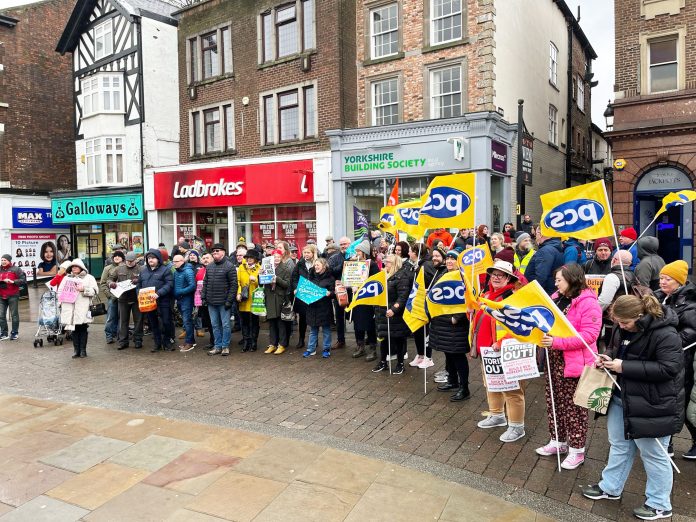Dave Semple, PCS branch secretary Wigan (personal capacity)
Civil servants and workers in privatised central government areas, 180,000 of whom are represented by the Public and Commercial Services (PCS) union, met in Brighton for a four-day conference from 22 May. The week began with group conferences, covering each government department.
Conference convenes during a pause in the union’s national campaign on pay, pensions, redundancy rights and jobs. On 9 May, PCS’ national reballot concluded with 106 different areas within the civil service clearing the 50% participation threshold imposed by the Tories’ 2016 anti-union laws.
In the Department for Work and Pensions (DWP), despite around 88% voting yes to strike action, because 48.7% voted in the ballot, the strike mandate was not renewed. This affects around 45,000 members. DWP group conference overwhelmingly agreed an urgent reballot, but was split on the use of action short of strike action.
Since 9 November when the first strike ballot result was achieved, with 100,000 members getting over the line, the union’s leadership (based around a grouping known as Left Unity) has called only three days of national strike action, and has opposed backing strikes up with action short of strikes.
DWP strikes
In the view of the Broad Left Network (BLN – the rank-and-file socialist organisation in PCS in which Socialist Party members participate) in DWP this has undermined the impact of our strikes.
In Bolton and Stockport, Universal Credit workers took nine days’ strike action. The key work from those sites was moved to other sites, except in a small number of sites where Socialist Party and BLN reps got agreement that members could opt out of covering strike work.
The strikes still created disruption, but they could have been more successful if backed by national boycotts of strike work. This would only be possible if the ballot included action short of strikes.
Similarly, faced with selective strike action (where small areas take weeks of strike action and are paid strike pay by PCS), the response of the government has been to turn on the overtime taps.
An overtime ban would quickly curtail this ability of the government to cope with our strikes. Other unions, such as Aslef and UCU, and even sister civil service union Prospect, have used action short of strikes.
Left Unity supporters elected to the union’s DWP group executive committee argued that members can’t afford unpaid national strike action, and can’t afford overtime bans. Despite the leadership motion suggesting action short of strike action would be kept under review, they said openly in speeches that they opposed balloting on this.
Our concern is that the leadership of the union risks creating demoralisation, which it then leans on to argue against action.
In outgoing general secretary Mark Serwotka’s contribution as a guest speaker at DWP conference, he nonetheless stated that the NEC will support any group seeking to ballot for action short of strike. Those NEC members have opposed that, but members should take Serwotka’s words and fight for that to happen.
The leadership motion was passed on a hand vote, which we estimate at 45-32.
Jobs
Positively, in contrast to 2022, the leadership in DWP has accepted the need for a group-wide campaign on staffing. Jobcentre work coaches face 360 minutes of face-to-face appointments; Universal Credit case workers face caseloads of up to 2,000 claimants in a system designed for 900; Retirement Services workers are similarly deluged. It is therefore vital that this develops as a bold campaign including action.
All through DWP group conference, small groups of reps have said that not enough is being done, for example, to oppose victimisation of union reps, to fight for Universal Credit members who are under enormous pressure, and on green issues.
A layer watches to see what the impact of selective action has been. So far there are no serious talks on 2022-23 or 2023-24 pay and nothing on pensions, redundancy rights and jobs.
Socialist Party and BLN supporters will continue to work to build a fighting, democratic union, and to build the strongest national campaign possible: to overturn a decade and a half of pay austerity, to reverse the attacks on our pensions, to protect our redundancy rights, and to win a national staffing campaign.
We call on all reps, at conference or not, to join us in this struggle.
Mark Serwotka retirement
PCS general secretary Mark Serwotka has announced his retirement, to take effect on 31 January 2024. The NEC is proposing to hold a special election for both General Secretary and Assistant General Secretary.
The Broad Left Network (BLN) argues that elections for these posts should take place together with the NEC elections early next year. This makes sense for reasons of cost, and to avoid running these elections at a time when reps and members are totally committed to winning the critical dispute on pay and jobs.
The BLN believes a left challenge in these elections is vital in the interests of our members and the future of the union.
Join the discussion: ‘How we fight the anti-union laws’ at the National Shop Stewards Network conference in London on 24 June.
2023 NSSN Conference – Saturday 24 June in Conway Hall, London 11am-4.30pm –Attendance fee £6. You can register on the day at conference or email us in advance via [email protected]
Confirmed speakers so far: NIPSA General Secretary Carmel Gates, BFAWU General Secretary Sarah Woolley, POA General Secretary Steve Gillan, NAPO National Official Annoesjka Valent, GMB Officer Gary Palmer from the victorious #GMBThree







